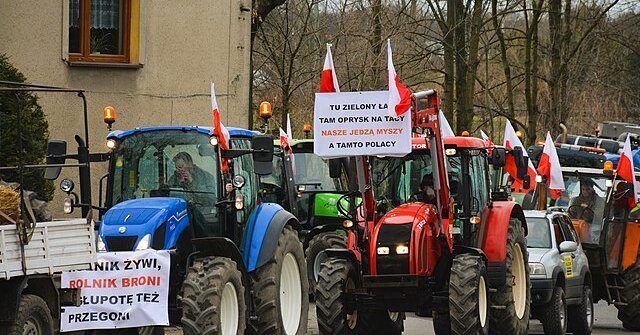In April of last year,Polish farmers began protesting and blocking roads and demanding the imposition of tariffs and duties on Ukrainian grain imports. Since then, protests have spread throughout Europe, with lines of tractors blocking traffic on busy roads or farmers dumping manure in front of government buildings becoming a common sight, reaching all the way to the European Parliament in Brussels on 1 February. While the grievances of farmers vary between nationalities, most of them perceive European Union environmental regulations as placing an overwhelming financial burden on their already limited revenues. Therefore, to satisfy the farmers’ demands, the EU executive rushed to scrap key policy proposals from the EU green agenda. However, if the EU is to slash emissions by 90% by 2040, as the Commission recently proposed, and become carbon neutral by 2050, in line with the legally binding Paris Agreement targets, how can this be achieved without reining in on emissions stemming from the agricultural sector?
The Scientific Recommendation vs the Commission’s Response to the Protests
The assessment report for 2024 by the European Scientific Advisory Board on Climate Change highlights several critical points: currently, non-CO2 emissions from agriculture account for 11% of the EU’s total net GHG emissions (this has remained unchanged since 2005, and argued that GHG emissions from the sector need to fall in line with the EU’s climate neutrality targets, pointing out an emissions reduction target of at least 30% by 2050 as achievable with some changes in both supply and demand behaviour, as well by reforming the Common Agricultural Policy so that it gives greater support to low-emission agricultural practices). As reported by POLITICO, the original draft of the Commission’s recommendation was supposed to include a target for the agricultural sector in line with the Advisory Board’s assessment. However, this was scrapped in response to the protests, as well as any recommendations to change citizens’ dietary behaviours and to stop state subsidies on fossil fuels, most prominently Diesel, which was also one of the farmers’ key demands. The Commission also pulled back a proposed regulation to cut pesticide use by 50% by 2030.
An Obvious Contradiction?
Clearly, the farmers’ concerns are legitimate, and they ultimately deserve attention from the EU and their respective national governments. Despite a boom in 2022, farmers’ profits in 2023 have decreased by 9%, with several factors undercutting their earnings, including cheaper imports, rising input costs, issues in the supply chains, a clear imbalance in the CAP, which favours larger players, and finally also climate change. Extreme weather events have become more and more frequent all across Europe, causing extensive damage to crops, extreme droughts that lead to water scarcity and raging wildfires, and floods in countries like Italy, causing hundreds of billions of euros in damages. As such, the question appears almost self-evident: are the farmers’ demands to scale down the EU climate agenda not contradictory when climate change is heavily damaging their income?
Is There a Solution to This Contradiction?
As with most decisions concerning climate change, it is never easy for policymakers to satisfy everyone’s demands. At least rhetorically, many counterarguments can be made against the message of this article, such as that compared to other sectors, including the industrial or the transport sectors, the agricultural sector is producing a relatively minimal part of the EU’s total greenhouse gas emissions. Regardless of the rhetoric, the science is clear and it shows that if we hope to reach the legally binding targets of the Paris Agreement, even the emissions coming from the agricultural sector must be tackled. This does not mean we should abandon our farmers. They play a critical role in our society, since as they rightfully say, if they stop working, we will not have food on our tables, and they also make up an intrinsic component of our customs and traditions.
Taking these factors into account, farmers should obviously be supported so that they can transition to more low-emission agricultural practices without bearing the heavy costs of the change. To do so, a good place to start would be by reforming the CAP, in line with what was suggested by the European Scientific Advisory Board on Climate Change. Simply abandoning climate policies would be a way to push the problem down the road, ultimately only leading to a worsening of the situation in the long run. Despite this, with the upcoming European Elections, the feeling in Europe is that politicians have once again prioritized short-term electoral benefits over the common good.

Follow the comments: |
|
